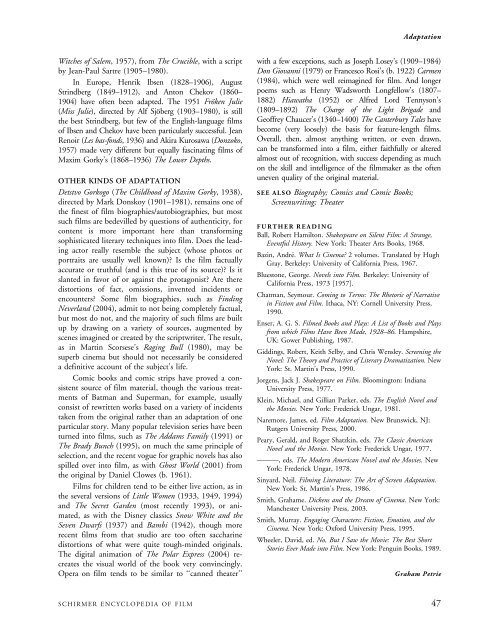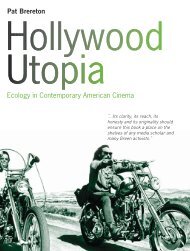Schirmer Encyclopedia of Film
Schirmer Encyclopedia of Film
Schirmer Encyclopedia of Film
You also want an ePaper? Increase the reach of your titles
YUMPU automatically turns print PDFs into web optimized ePapers that Google loves.
Witches <strong>of</strong> Salem, 1957), from The Crucible, with a script<br />
by Jean-Paul Sartre (1905–1980).<br />
In Europe, Henrik Ibsen (1828–1906), August<br />
Strindberg (1849–1912), and Anton Chekov (1860–<br />
1904) have <strong>of</strong>ten been adapted. The 1951 Fröken Julie<br />
(Miss Julie), directed by Alf Sjöberg (1903–1980), is still<br />
the best Strindberg, but few <strong>of</strong> the English-language films<br />
<strong>of</strong> Ibsen and Chekov have been particularly successful. Jean<br />
Renoir (Les bas-fonds, 1936) and Akira Kurosawa (Donzoko,<br />
1957) made very different but equally fascinating films <strong>of</strong><br />
Maxim Gorky’s (1868–1936) The Lower Depths.<br />
OTHER KINDS OF ADAPTATION<br />
Detstvo Gorkogo (The Childhood <strong>of</strong> Maxim Gorky, 1938),<br />
directed by Mark Donskoy (1901–1981), remains one <strong>of</strong><br />
the finest <strong>of</strong> film biographies/autobiographies, but most<br />
such films are bedevilled by questions <strong>of</strong> authenticity, for<br />
content is more important here than transforming<br />
sophisticated literary techniques into film. Does the leading<br />
actor really resemble the subject (whose photos or<br />
portraits are usually well known)? Is the film factually<br />
accurate or truthful (and is this true <strong>of</strong> its source)? Is it<br />
slanted in favor <strong>of</strong> or against the protagonist? Are there<br />
distortions <strong>of</strong> fact, omissions, invented incidents or<br />
encounters? Some film biographies, such as Finding<br />
Neverland (2004), admit to not being completely factual,<br />
but most do not, and the majority <strong>of</strong> such films are built<br />
up by drawing on a variety <strong>of</strong> sources, augmented by<br />
scenes imagined or created by the scriptwriter. The result,<br />
as in Martin Scorsese’s Raging Bull (1980), may be<br />
superb cinema but should not necessarily be considered<br />
a definitive account <strong>of</strong> the subject’s life.<br />
Comic books and comic strips have proved a consistent<br />
source <strong>of</strong> film material, though the various treatments<br />
<strong>of</strong> Batman and Superman, for example, usually<br />
consist <strong>of</strong> rewritten works based on a variety <strong>of</strong> incidents<br />
taken from the original rather than an adaptation <strong>of</strong> one<br />
particular story. Many popular television series have been<br />
turned into films, such as The Addams Family (1991) or<br />
The Brady Bunch (1995), on much the same principle <strong>of</strong><br />
selection, and the recent vogue for graphic novels has also<br />
spilled over into film, as with Ghost World (2001) from<br />
the original by Daniel Clowes (b. 1961).<br />
<strong>Film</strong>s for children tend to be either live action, as in<br />
the several versions <strong>of</strong> Little Women (1933, 1949, 1994)<br />
and The Secret Garden (most recently 1993), or animated,<br />
as with the Disney classics Snow White and the<br />
Seven Dwarfs (1937) and Bambi (1942), though more<br />
recent films from that studio are too <strong>of</strong>ten saccharine<br />
distortions <strong>of</strong> what were quite tough-minded originals.<br />
The digital animation <strong>of</strong> The Polar Express (2004) recreates<br />
the visual world <strong>of</strong> the book very convincingly.<br />
Opera on film tends to be similar to ‘‘canned theater’’<br />
with a few exceptions, such as Joseph Losey’s (1909–1984)<br />
Don Giovanni (1979) or Francesco Rosi’s (b. 1922) Carmen<br />
(1984), which were well reimagined for film. And longer<br />
poems such as Henry Wadsworth Longfellow’s (1807–<br />
1882) Hiawatha (1952) or Alfred Lord Tennyson’s<br />
(1809–1892) The Charge <strong>of</strong> the Light Brigade and<br />
Ge<strong>of</strong>frey Chaucer’s (1340–1400) The Canterbury Tales have<br />
become (very loosely) the basis for feature-length films.<br />
Overall, then, almost anything written, or even drawn,<br />
can be transformed into a film, either faithfully or altered<br />
almost out <strong>of</strong> recognition, with success depending as much<br />
on the skill and intelligence <strong>of</strong> the filmmaker as the <strong>of</strong>ten<br />
uneven quality <strong>of</strong> the original material.<br />
SEE ALSO Biography; Comics and Comic Books;<br />
Screenwriting; Theater<br />
Adaptation<br />
FURTHER READING<br />
Ball, Robert Hamilton. Shakespeare on Silent <strong>Film</strong>: A Strange,<br />
Eventful History. New York: Theater Arts Books, 1968.<br />
Bazin, André. What Is Cinema? 2 volumes. Translated by Hugh<br />
Gray. Berkeley: University <strong>of</strong> California Press, 1967.<br />
Bluestone, George. Novels into <strong>Film</strong>. Berkeley: University <strong>of</strong><br />
California Press, 1973 [1957].<br />
Chatman, Seymour. Coming to Terms: The Rhetoric <strong>of</strong> Narrative<br />
in Fiction and <strong>Film</strong>. Ithaca, NY: Cornell University Press,<br />
1990.<br />
Enser, A. G. S. <strong>Film</strong>ed Books and Plays: A List <strong>of</strong> Books and Plays<br />
from which <strong>Film</strong>s Have Been Made, 1928–86. Hampshire,<br />
UK: Gower Publishing, 1987.<br />
Giddings, Robert, Keith Selby, and Chris Wensley. Screening the<br />
Novel: The Theory and Practice <strong>of</strong> Literary Dramatization. New<br />
York: St. Martin’s Press, 1990.<br />
Jorgens, Jack J. Shakespeare on <strong>Film</strong>. Bloomington: Indiana<br />
University Press, 1977.<br />
Klein, Michael, and Gillian Parker, eds. The English Novel and<br />
the Movies. New York: Frederick Ungar, 1981.<br />
Naremore, James, ed. <strong>Film</strong> Adaptation. New Brunswick, NJ:<br />
Rutgers University Press, 2000.<br />
Peary, Gerald, and Roger Shatzkin, eds. The Classic American<br />
Novel and the Movies. New York: Frederick Ungar, 1977.<br />
———, eds. The Modern American Novel and the Movies. New<br />
York: Frederick Ungar, 1978.<br />
Sinyard, Neil. <strong>Film</strong>ing Literature: The Art <strong>of</strong> Screen Adaptation.<br />
New York: St. Martin’s Press, 1986.<br />
Smith, Grahame. Dickens and the Dream <strong>of</strong> Cinema. New York:<br />
Manchester University Press, 2003.<br />
Smith, Murray. Engaging Characters: Fiction, Emotion, and the<br />
Cinema. New York: Oxford University Press, 1995.<br />
Wheeler, David, ed. No, But I Saw the Movie: The Best Short<br />
Stories Ever Made into <strong>Film</strong>. New York: Penguin Books, 1989.<br />
Graham Petrie<br />
SCHIRMER ENCYCLOPEDIA OF FILM 47
















